2 june 2019

The Islamic Movement, activist youth and other groups staged a protest sit-in, in the vicinity of the US embassy in Amman, this past week, to express their rejection of a visit byJared Kushner, US President Donald Turmp’s senior adviser.
Jordanian security forces closed the square facing the embassy and prevented demonstrators from performing Isha and Taraweeh prayers in the zone.
The participants stood away from the embassy, carrying placards calling on Jordanian leadership not to receive Kushner or participate in the Bahrain economic workshop.
They also chanted slogans against the US, Kushner and Israel, Days of Palestine reports.
Addressing the crowds, secretary-general of the Muslim Brotherhood Abdul-Hamid al-Dunaibat called on the Jordanian government to be clear about its position towards the participation in the Bahrain conference.
Dunaibat called on Kushner to go back to his country, stressing that Jordan is not for sale and will not be a substitute homeland for anyone.
He slammed the rulers of the Gulf countries for scrambling to the arms of Israel and Trump, and allowing the latter to plunder their wealth.
Jordanian security forces closed the square facing the embassy and prevented demonstrators from performing Isha and Taraweeh prayers in the zone.
The participants stood away from the embassy, carrying placards calling on Jordanian leadership not to receive Kushner or participate in the Bahrain economic workshop.
They also chanted slogans against the US, Kushner and Israel, Days of Palestine reports.
Addressing the crowds, secretary-general of the Muslim Brotherhood Abdul-Hamid al-Dunaibat called on the Jordanian government to be clear about its position towards the participation in the Bahrain conference.
Dunaibat called on Kushner to go back to his country, stressing that Jordan is not for sale and will not be a substitute homeland for anyone.
He slammed the rulers of the Gulf countries for scrambling to the arms of Israel and Trump, and allowing the latter to plunder their wealth.
1 june 2019
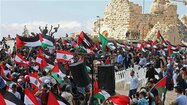
Protesters, including Lebanese nationals and Palestinian refugees, wave Palestinian and Lebanese flags during a demonstration in the medieval Beaufort Castle, known in Arabic as al-Shaqif Citadel, near Arnoun, Lebanon, May 15, 2018
US President Donald Trump's "the deal of the century" wants Palestinian refugees to be naturalized and settled in several countries, including Lebanon, Syria, Jordan and Iraq, Israeli daily Haaretz reports.
As the world marked the International Quds Day on Friday, political leaders warned of mysterious aspects of the much-touted US plan and its ramifications for the future of Palestinians.
Iran's Parliament Speaker Ali Larijani said one definite prospect is that the plan seeks to do away with the issue of returning 6 million refugees to their homeland.
"To realize this goal, America is about to arrange an economic deal and get its money from the miserable Persian Gulf countries," he said in Tehran.
Haaretz said Washington is thought to be pressing Lebanon to grant citizenship to Palestinian refugees living in the country.
"In the process, this is seen as defusing the issue of a right of return of refugees to Israel, which has been a major obstacle to resolving the Israeli-Palestinian conflict," the paper said.
According to UNRWA, the UN's Palestinian refugee agency, about 450,000 Palestinian refugees live in Lebanon.
Other reports have put the figure lower, prompting Lebanese groups to say that the census had been conducted under US pressure designed to underreport the real numbers because that way Lebanon could absorb a modest-sized population.
The Lebanese constitution, however, provides that the country's territory is indivisible and that refugees living there are not to receive citizenship.
The official reason for this is that the absorption of Palestinian refugees would impair their claim to a right of return.
However, the US has sugarcoated the plan with a lifeline to extract Lebanon from its economic crisis, where the country's debt is estimated at more than $85 billion (about 155 percent of GDP), Haaretz said.
According to the Israeli paper, giving Palestinians citizenship is likely to prompt the roughly 1 million Syrian refugees in the country to demand similar status.
However, Lebanon isn't the only country concerned about Washington dictating a solution to the refugee problem.
Jordan is horrified over the prospect that the United States will demand it absorb hundreds of thousands or even a million Palestinian refugees in the country, Haaretz added.
The paper cited investigative journalist Vicky Ward recounting in her new book "Kushner Inc.: Greed. Ambition. Corruption" that the Trump administration's plan sees Jordan providing territory to the Palestinians and receiving Saudi territory in return.
The Saudis, for their part, would get the islands of Sanafir and Tiran from Egypt, it said.
"Land swaps appear to be the magic formula that the Trump administration has adopted, and not just for Jordan," Haaretz said.
According to Ward, it has been suggested that Egypt give up territory along the Sinai coast between Gaza and el-Arish, to which some of the Gaza population would be transferred. In return, Israel would give Egypt territory of equivalent size in the western Negev.
Haaretz, meanwhile, revealed lucrative projects to be funded by European countries, the US and wealthy Arab states, including an underwater tunnel which Israel would allow to be dug between Egypt and Saudi Arabia.
Egypt, the paper said, has been promised a whopping $65 billion to help boost its economy which is currently in shambles.
The plan also says Palestinian refugees in Syria, Iraq and other Arab countries would receive citizenship in exchange for generous assistance to the host countries.
The Israeli paper, however, cast doubt on the viability of the "plan of generous financial compensation and empty tracts of land for new housing".
"The problem is that the Palestinian refugees are the supreme symbols of Palestinian nationhood," it said.
"An American deal that blatantly relies on buying up that symbol for cash, even lots of it, can't be acceptable to the Palestinian leaders in the West Bank and Gaza," it added.
The Trump administration is set to unveil the economic portion of the so-called “deal of the century” during a conference in Manama, Bahrain, on June 25-26.
All Palestinian factions have boycotted the event, accusing Washington of offering financial rewards for accepting the Israeli occupation.
Saudi Arabia and the UAE have said they will send delegations to the Manama forum and Israel’s Finance Minister Moshe Kahlon has said he intends to attend.
US President Donald Trump's "the deal of the century" wants Palestinian refugees to be naturalized and settled in several countries, including Lebanon, Syria, Jordan and Iraq, Israeli daily Haaretz reports.
As the world marked the International Quds Day on Friday, political leaders warned of mysterious aspects of the much-touted US plan and its ramifications for the future of Palestinians.
Iran's Parliament Speaker Ali Larijani said one definite prospect is that the plan seeks to do away with the issue of returning 6 million refugees to their homeland.
"To realize this goal, America is about to arrange an economic deal and get its money from the miserable Persian Gulf countries," he said in Tehran.
Haaretz said Washington is thought to be pressing Lebanon to grant citizenship to Palestinian refugees living in the country.
"In the process, this is seen as defusing the issue of a right of return of refugees to Israel, which has been a major obstacle to resolving the Israeli-Palestinian conflict," the paper said.
According to UNRWA, the UN's Palestinian refugee agency, about 450,000 Palestinian refugees live in Lebanon.
Other reports have put the figure lower, prompting Lebanese groups to say that the census had been conducted under US pressure designed to underreport the real numbers because that way Lebanon could absorb a modest-sized population.
The Lebanese constitution, however, provides that the country's territory is indivisible and that refugees living there are not to receive citizenship.
The official reason for this is that the absorption of Palestinian refugees would impair their claim to a right of return.
However, the US has sugarcoated the plan with a lifeline to extract Lebanon from its economic crisis, where the country's debt is estimated at more than $85 billion (about 155 percent of GDP), Haaretz said.
According to the Israeli paper, giving Palestinians citizenship is likely to prompt the roughly 1 million Syrian refugees in the country to demand similar status.
However, Lebanon isn't the only country concerned about Washington dictating a solution to the refugee problem.
Jordan is horrified over the prospect that the United States will demand it absorb hundreds of thousands or even a million Palestinian refugees in the country, Haaretz added.
The paper cited investigative journalist Vicky Ward recounting in her new book "Kushner Inc.: Greed. Ambition. Corruption" that the Trump administration's plan sees Jordan providing territory to the Palestinians and receiving Saudi territory in return.
The Saudis, for their part, would get the islands of Sanafir and Tiran from Egypt, it said.
"Land swaps appear to be the magic formula that the Trump administration has adopted, and not just for Jordan," Haaretz said.
According to Ward, it has been suggested that Egypt give up territory along the Sinai coast between Gaza and el-Arish, to which some of the Gaza population would be transferred. In return, Israel would give Egypt territory of equivalent size in the western Negev.
Haaretz, meanwhile, revealed lucrative projects to be funded by European countries, the US and wealthy Arab states, including an underwater tunnel which Israel would allow to be dug between Egypt and Saudi Arabia.
Egypt, the paper said, has been promised a whopping $65 billion to help boost its economy which is currently in shambles.
The plan also says Palestinian refugees in Syria, Iraq and other Arab countries would receive citizenship in exchange for generous assistance to the host countries.
The Israeli paper, however, cast doubt on the viability of the "plan of generous financial compensation and empty tracts of land for new housing".
"The problem is that the Palestinian refugees are the supreme symbols of Palestinian nationhood," it said.
"An American deal that blatantly relies on buying up that symbol for cash, even lots of it, can't be acceptable to the Palestinian leaders in the West Bank and Gaza," it added.
The Trump administration is set to unveil the economic portion of the so-called “deal of the century” during a conference in Manama, Bahrain, on June 25-26.
All Palestinian factions have boycotted the event, accusing Washington of offering financial rewards for accepting the Israeli occupation.
Saudi Arabia and the UAE have said they will send delegations to the Manama forum and Israel’s Finance Minister Moshe Kahlon has said he intends to attend.
30 may 2019
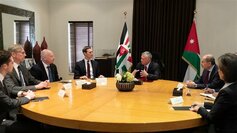
Jordan’s King Abdullah II has called for the formation of an independent Palestinian state along the 1967 boundaries with East Jerusalem al-Quds as its capital, in what appears to be at odds with Washington’s upcoming proposal on the Israeli-Palestinian conflict.
He made the remarks in a meeting with a US delegation headed by US President Donald Trump’s son-in-law and senior adviser Jared Kushner, along with Middle East Envoy Jason Greenblatt, in Amman on Wednesday.
King Abdullah II, who acts as the custodian of Islamic holy sites in Jerusalem al-Quds, expressed his commitment to the so-called two-state solution.
The Jordan king had “stressed the need to step up all efforts to achieve comprehensive and lasting peace on the basis of the two-state solution, guaranteeing the establishment of an independent Palestinian state on the 4 June 1967 lines, with East Jerusalem [al-Quds] as its capital ... in accordance with international law and relevant UN resolutions,” the Royal Hashemite Court said in a statement.
Meanwhile, Jordan’s official Petra news agency reported that the two sides had exchanged views on “regional developments, especially efforts to resolve the Palestinian-Israeli conflict.”
Greenblatt also tweeted that he had a “constructive meeting” with King Abdullah II that included “a good conversation about regional dynamics.”
The US delegation is meeting with top officials in Morocco, Jordan and Israel this week before it unveils the economic portion of the so-called “deal of the century” during a conference in Manama, Bahrain, on June 25-26.
On Tuesday, Kushner and Greenblatt held talks with Morocco’s King Mohammed VI on the Manama forum, which has been boycotted by all Palestinian factions.
The Palestinians have also rejected the US Middle East initiative as “the slap of the century” because it is said to hugely favor Israel.
On Tuesday evening, Jordanian activists held a protest near the heavily-fortified American embassy in Amman to denounce Kushner’s visit and Trump's plan on the Israeli-Palestinian conflict.
The demonstrators chanted slogans such as “The deal of the century will not pass,” and “Down with the US.”
They also held placards reading, “No to the deal of the century,” and “Go back home Kushner.”
Addressing the crowd, Abdul Hamid Thunaibat, leader of the Jordan’s Muslim Brotherhood, called on the government to adopt a clear position regarding its participation in the Bahrain conference.
Saudi Arabia and the UAE have said they will send delegations to the event and Israel’s Finance Minister Moshe Kahlon has said he will also intend to attend.
The so-called Middle East peace process was dealt a major blow in December 2017, when Trump recognized Jerusalem al-Quds as the “capital” of Israel. He also moved the American embassy from Tel Aviv to the Israeli-occupied city in May 2018.
Angered by Trump’s contentious move, Palestinian President Mahmoud Abbas said Palestine would no longer recognize the US as a mediator in the decades-long conflict with Israel.
He made the remarks in a meeting with a US delegation headed by US President Donald Trump’s son-in-law and senior adviser Jared Kushner, along with Middle East Envoy Jason Greenblatt, in Amman on Wednesday.
King Abdullah II, who acts as the custodian of Islamic holy sites in Jerusalem al-Quds, expressed his commitment to the so-called two-state solution.
The Jordan king had “stressed the need to step up all efforts to achieve comprehensive and lasting peace on the basis of the two-state solution, guaranteeing the establishment of an independent Palestinian state on the 4 June 1967 lines, with East Jerusalem [al-Quds] as its capital ... in accordance with international law and relevant UN resolutions,” the Royal Hashemite Court said in a statement.
Meanwhile, Jordan’s official Petra news agency reported that the two sides had exchanged views on “regional developments, especially efforts to resolve the Palestinian-Israeli conflict.”
Greenblatt also tweeted that he had a “constructive meeting” with King Abdullah II that included “a good conversation about regional dynamics.”
The US delegation is meeting with top officials in Morocco, Jordan and Israel this week before it unveils the economic portion of the so-called “deal of the century” during a conference in Manama, Bahrain, on June 25-26.
On Tuesday, Kushner and Greenblatt held talks with Morocco’s King Mohammed VI on the Manama forum, which has been boycotted by all Palestinian factions.
The Palestinians have also rejected the US Middle East initiative as “the slap of the century” because it is said to hugely favor Israel.
On Tuesday evening, Jordanian activists held a protest near the heavily-fortified American embassy in Amman to denounce Kushner’s visit and Trump's plan on the Israeli-Palestinian conflict.
The demonstrators chanted slogans such as “The deal of the century will not pass,” and “Down with the US.”
They also held placards reading, “No to the deal of the century,” and “Go back home Kushner.”
Addressing the crowd, Abdul Hamid Thunaibat, leader of the Jordan’s Muslim Brotherhood, called on the government to adopt a clear position regarding its participation in the Bahrain conference.
Saudi Arabia and the UAE have said they will send delegations to the event and Israel’s Finance Minister Moshe Kahlon has said he will also intend to attend.
The so-called Middle East peace process was dealt a major blow in December 2017, when Trump recognized Jerusalem al-Quds as the “capital” of Israel. He also moved the American embassy from Tel Aviv to the Israeli-occupied city in May 2018.
Angered by Trump’s contentious move, Palestinian President Mahmoud Abbas said Palestine would no longer recognize the US as a mediator in the decades-long conflict with Israel.
27 may 2019
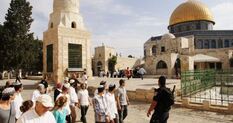
Jordan's Foreign Ministry on Sunday strongly denounced the ongoing Israeli violations against al-Aqsa Mosque and the restrictions on worshipers and Awqaf personnel.
The ministry's spokesperson Sufyan Qudah said Israel, as an occupying authority, must abide by its obligations in accordance with international law and respect the historical and legal status of al-Aqsa Mosque and the feelings of Muslims, especially during the last 10 days of the holy month of Ramadan.
Qudah called on the Israeli authorities to immediately halt their provocative practices, and held them responsible for the safety of the holy site and the worshipers.
Earlier on Sunday, the Israeli occupation police arrested three Palestinian worshipers inside al-Aqsa Mosque's compound after violently beating them, while dozens of Jewish settlers broke into the site and roamed its courtyards freely under police guard.
The ministry's spokesperson Sufyan Qudah said Israel, as an occupying authority, must abide by its obligations in accordance with international law and respect the historical and legal status of al-Aqsa Mosque and the feelings of Muslims, especially during the last 10 days of the holy month of Ramadan.
Qudah called on the Israeli authorities to immediately halt their provocative practices, and held them responsible for the safety of the holy site and the worshipers.
Earlier on Sunday, the Israeli occupation police arrested three Palestinian worshipers inside al-Aqsa Mosque's compound after violently beating them, while dozens of Jewish settlers broke into the site and roamed its courtyards freely under police guard.
30 apr 2019
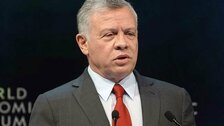
A handout picture released by the Jordanian Royal Palace on April 6, 2019 shows King Abdullah II of Jordan speaking during the opening ceremony of the 2019 World Economic Forum on the Middle East and North Africa, at the King Hussein Convention Center at the Dead Sea, Jordan.
Jordanian King Abdullah II has ordered a review of his country’s multi-billion-dollar deal to import natural gas from the Israeli-occupied territories.
The London-based and Arabic-language Asharq al-Awsat newspaper, citing senior Jordanian political sources, reported that the king made the decision “in a technical report that examines Jordan’s interests from the continuation or the freezing of the agreement.”
Khaled Bakkar, the head of the finance committee in the Jordanian parliament, said the gas deal apart from being “blatant normalization” with the Israeli regime, is “economically weak” based on the feasibility studies.
He stressed that Jordan’s energy production surpassed the country’s needs, and the import of Israeli gas was only for the benefit of the Tel Aviv regime.
On September 26, 2016, Jordan’s National Electric Power Company signed a 10-billion-dollar deal with US-based Noble Energy and Israeli partners, which will tap the Leviathan natural gas field in the Mediterranean Sea off the coast of Israel for the supply of approximately 1.6 trillion cubic feet of natural gas, or 300 million cubic feet per day (mcf/d), over a 15-year term. Production is expected to begin around 2019 or 2020.
On March 26, members of Jordan’s parliament called for the cancellation of the gas deal with Israel during a parliamentary session closed to the public.
House Speaker Atef Tarawneh stated that all sectors of the society and members of parliament utterly reject Jordanian electricity company agreement to buy Israeli natural gas.
Several legislators argued that the multi-billion-dollar deal violates Article 33, section two of the Jordanian constitution, which states: “Treaties and agreements which entail any expenditures to the Treasury of the State or affect the public or private rights of Jordanians shall not be valid unless approved by the parliament; and in no case shall the secret terms in a treaty or agreement be contrary to the overt terms.”
Lawmaker Saddah al-Habashneh said the deal was unconstitutional, stressing that members of parliament were not given access to read what he called the “secret” deal.
“Why are they hiding it? It’s a clue that there is something. It is totally rejected,” he commented.
Habashneh then demanded the deal be scrapped along with Jordan’s peace accord with Israel – known as Wadi Araba Treaty and signed on October 26, 1994.
“We are calling for the Wadi Araba agreement to be dropped. What is peace when they’re attacking Gaza?” the parliamentarian said.
“And with yesterday’s recognition of the Golan Heights, what’s left? We want dignity,” he pointed out.
On March 25, US President Donald Trump signed a proclamation, formally recognizing Israel's sovereignty over the Golan Heights. The announcement came as Israeli Prime Minister Benjamin Netanyahu visited the White House.
The Syrian Ministry of Foreign Affairs and Expatriates, in a statement, called the US decision a “blatant attack on the sovereignty and territorial integrity” of Syria.
“The liberation of the Golan by all available means and its return to the Syrian motherland is an inalienable right,” according to the statement carried by Syria’s official news agency SANA, which added, “The decision ... makes the United States the main enemy of the Arabs.”
The Arab League also condemned the move, saying "Trump's recognition does not change the area's status."
Iran, Iraq, Russia and Turkey also condemned the US move.
Israel seized the Golan Heights from Syria after the 1967 Six-Day War and later occupied it in a move that has never been recognized by the international community.
The regime has built dozens of settlements in the area ever since and has used the region to carry out a number of military operations against the Syrian government.
Jordanian King Abdullah II has ordered a review of his country’s multi-billion-dollar deal to import natural gas from the Israeli-occupied territories.
The London-based and Arabic-language Asharq al-Awsat newspaper, citing senior Jordanian political sources, reported that the king made the decision “in a technical report that examines Jordan’s interests from the continuation or the freezing of the agreement.”
Khaled Bakkar, the head of the finance committee in the Jordanian parliament, said the gas deal apart from being “blatant normalization” with the Israeli regime, is “economically weak” based on the feasibility studies.
He stressed that Jordan’s energy production surpassed the country’s needs, and the import of Israeli gas was only for the benefit of the Tel Aviv regime.
On September 26, 2016, Jordan’s National Electric Power Company signed a 10-billion-dollar deal with US-based Noble Energy and Israeli partners, which will tap the Leviathan natural gas field in the Mediterranean Sea off the coast of Israel for the supply of approximately 1.6 trillion cubic feet of natural gas, or 300 million cubic feet per day (mcf/d), over a 15-year term. Production is expected to begin around 2019 or 2020.
On March 26, members of Jordan’s parliament called for the cancellation of the gas deal with Israel during a parliamentary session closed to the public.
House Speaker Atef Tarawneh stated that all sectors of the society and members of parliament utterly reject Jordanian electricity company agreement to buy Israeli natural gas.
Several legislators argued that the multi-billion-dollar deal violates Article 33, section two of the Jordanian constitution, which states: “Treaties and agreements which entail any expenditures to the Treasury of the State or affect the public or private rights of Jordanians shall not be valid unless approved by the parliament; and in no case shall the secret terms in a treaty or agreement be contrary to the overt terms.”
Lawmaker Saddah al-Habashneh said the deal was unconstitutional, stressing that members of parliament were not given access to read what he called the “secret” deal.
“Why are they hiding it? It’s a clue that there is something. It is totally rejected,” he commented.
Habashneh then demanded the deal be scrapped along with Jordan’s peace accord with Israel – known as Wadi Araba Treaty and signed on October 26, 1994.
“We are calling for the Wadi Araba agreement to be dropped. What is peace when they’re attacking Gaza?” the parliamentarian said.
“And with yesterday’s recognition of the Golan Heights, what’s left? We want dignity,” he pointed out.
On March 25, US President Donald Trump signed a proclamation, formally recognizing Israel's sovereignty over the Golan Heights. The announcement came as Israeli Prime Minister Benjamin Netanyahu visited the White House.
The Syrian Ministry of Foreign Affairs and Expatriates, in a statement, called the US decision a “blatant attack on the sovereignty and territorial integrity” of Syria.
“The liberation of the Golan by all available means and its return to the Syrian motherland is an inalienable right,” according to the statement carried by Syria’s official news agency SANA, which added, “The decision ... makes the United States the main enemy of the Arabs.”
The Arab League also condemned the move, saying "Trump's recognition does not change the area's status."
Iran, Iraq, Russia and Turkey also condemned the US move.
Israel seized the Golan Heights from Syria after the 1967 Six-Day War and later occupied it in a move that has never been recognized by the international community.
The regime has built dozens of settlements in the area ever since and has used the region to carry out a number of military operations against the Syrian government.
27 apr 2019
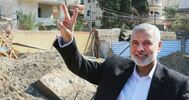
Head of Hamas’s political bureau Ismail Haneyya has applauded the supportive position of the Jordanian people and their leadership towards the Palestinian people and their national cause.
Haneyya made his remarks in a recorded speech, addressing participants in a festival organized on Friday by the Islamic Movement in Jordan on the border with Palestine.
Haneyya hailed the participants for marching to the Jordanian border with Palestine to assert their support for the Palestinian people’s rights and the Islamic holy sites, affirming that Jordan would remain the strategic depth of Jerusalem.
The Hamas official said that his Movement supports the position of the Jordanian King on the issue of Jerusalem and the substitute country, adding that the King’s recent stance in this regard reflected the voice of the Arab nation and the conscience of the Palestinian people.
“Today, we are facing the most dangerous station in the history of the conflict with the Zionist enemy, represented by the deal of the century that aims to liquidate the Palestinian cause, especially with regard to Jerusalem,” Haneyya said.
Haneyya made his remarks in a recorded speech, addressing participants in a festival organized on Friday by the Islamic Movement in Jordan on the border with Palestine.
Haneyya hailed the participants for marching to the Jordanian border with Palestine to assert their support for the Palestinian people’s rights and the Islamic holy sites, affirming that Jordan would remain the strategic depth of Jerusalem.
The Hamas official said that his Movement supports the position of the Jordanian King on the issue of Jerusalem and the substitute country, adding that the King’s recent stance in this regard reflected the voice of the Arab nation and the conscience of the Palestinian people.
“Today, we are facing the most dangerous station in the history of the conflict with the Zionist enemy, represented by the deal of the century that aims to liquidate the Palestinian cause, especially with regard to Jerusalem,” Haneyya said.
Page: 2 - 1
